Health
Makerere & Johns Hopkins Universities Release Report on Speed and Helmet Use in Kampala
Published
1 year agoon
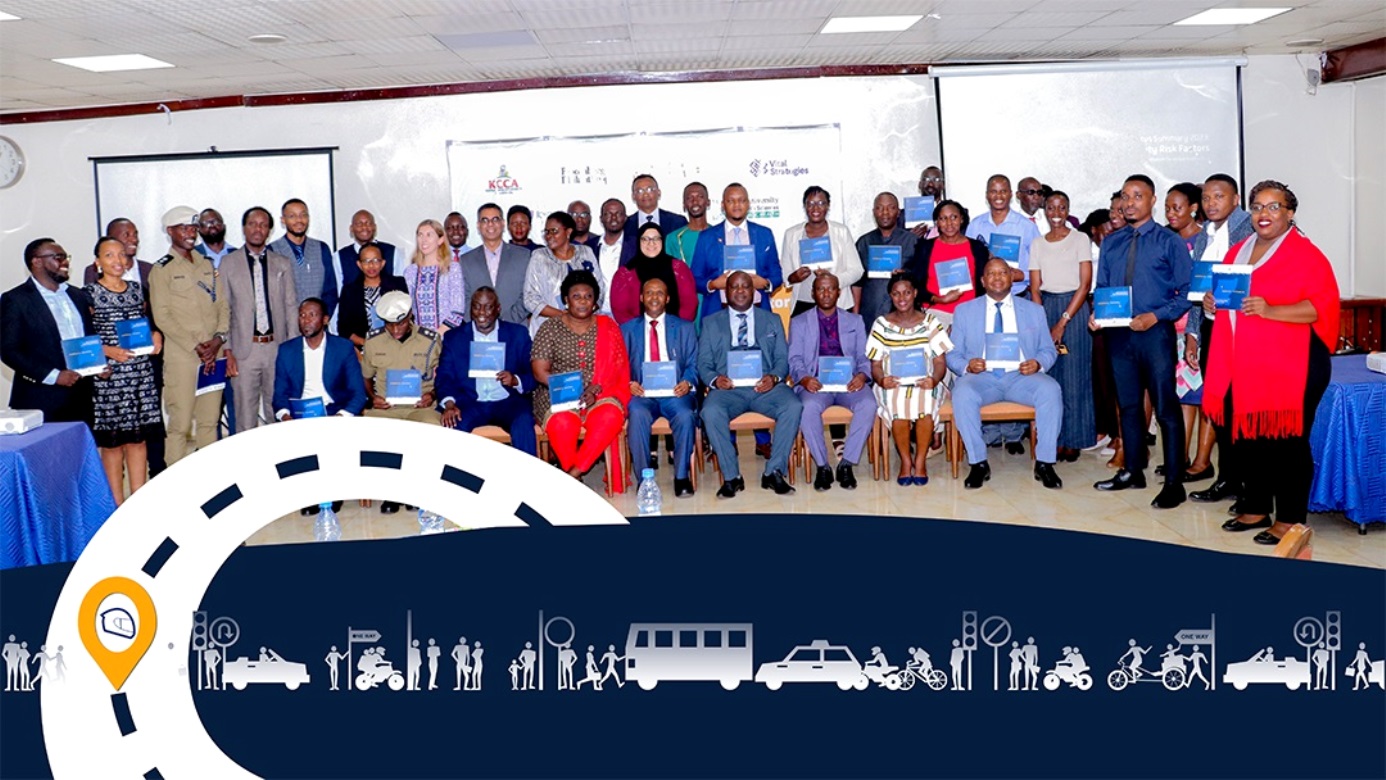
Makerere University School of Public Health (MakSPH) and the Johns Hopkins International Injury Research Unit (JH-IIRU) have launched the status summary report 2023; Road Risk Factors for Kampala, Uganda, in partnership with Kampala Capital City Authority (KCCA) and Vital Strategies.
The report was launched at Hotel Africana in Kampala on January 16, 2024. It delineates key findings, including the average speed of speeding vehicles at a high average of 57km/hr, higher speeds on roads partially accessible to pedestrians compared to roads freely accessible to pedestrians. Also, helmet usage remains low among motorcyclists and is almost non-existent among passengers, contributing to a rise in accidents and fatalities since 2020.
There has been a variable trend in the reported numbers of deaths and serious injuries since 2018. Specifically, in 2022, there was a 1% increase in reported deaths compared to 2021, while serious injuries witnessed a 4% decrease during the same period.
In 2018, a total of 294 death were recorded, 315 recorded in 2019 while 236 were recorded in 2020. In 2021, there were 419 road traffic death and 425 recorded in 2022. Motorcyclists accounted for nearly half (49%) of the reported deaths followed by pedestrians made up 44% of deaths. In a bid to improve road safety by providing quality data, the research the Bloomberg Philanthropies Initiative for Global Road Safety (BIGRS) made roadside observations on speed and helmet use in Kampala City.
The researchers made six observation rounds citing 500,000 for speed and 600,000 cyclists to determine helmet use. The results, based on data collected between February 2021 and October 2023 indicate that the mean speed among speeding vehicles was high mostly among sport utility vehicles (SUVs) at 10%, sedans/saloons at 9%, minibuses/minivans at 8), and pickup/light trucks at 7%. Five percent of the observed vehicles were exceeding the posted speed limit.
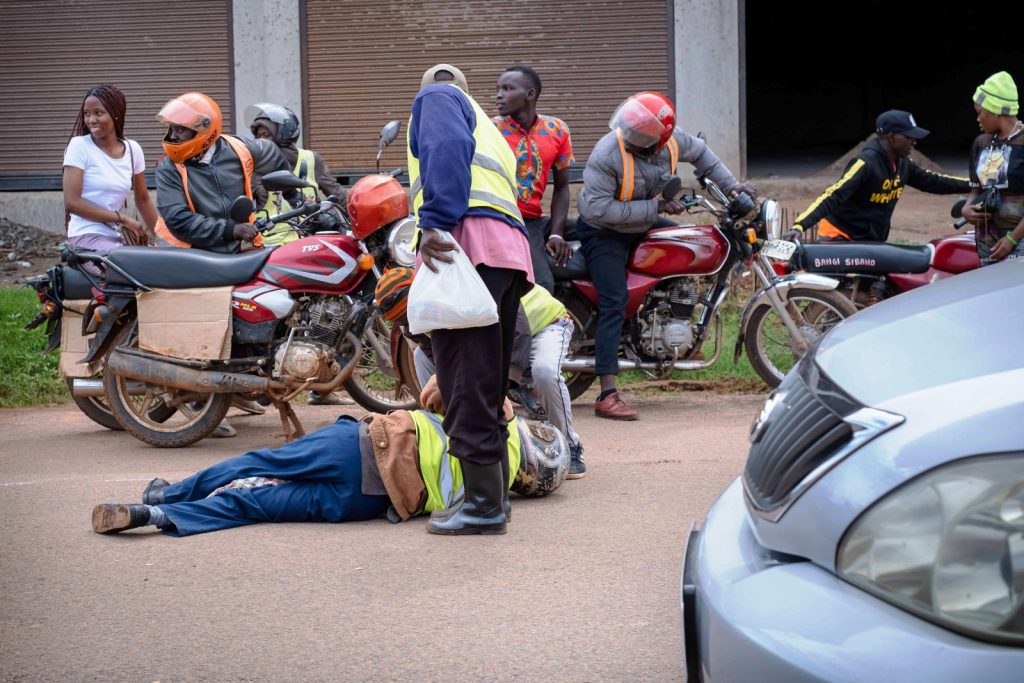
Speeding in Kampala
Presenting findings, Mr. Bonny Balugaba, a Researcher based at the Trauma, Injuries and Trauma Unit of MakSPH noted that the international best practices for speed management recommend a safe speed of 30 km/h on roads where conflicts between cars and unprotected users are possible. Also, 50 km/h speed is recommended at intersections where side-on conflicts between cars may occur. This is particularly applicable in urban areas.
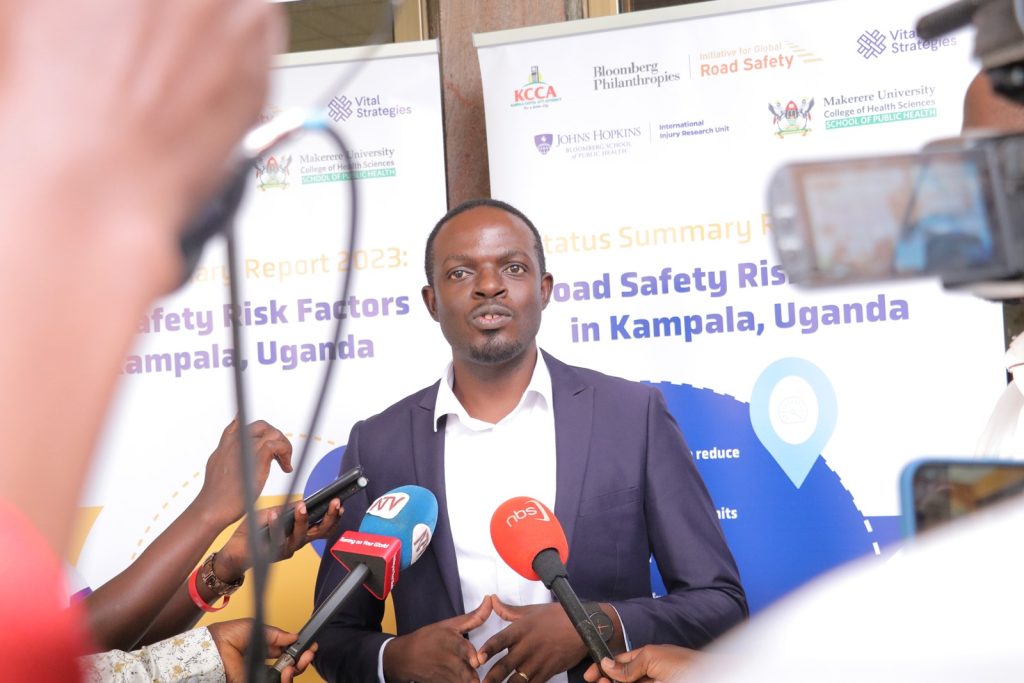
“If in Kampala we are seeing 57km/h speed, it means that we are way above the recommended speed limits and we know that beyond 40km/h, the chances of survival of someone that has been knocked are very minimal,” says Balugaba.
The researchers recommend enforcing a 50 km/h speed limit in metropolitan areas and a 30 km/h limit in places where motorized traffic interacts with bikes and pedestrians. In order to safeguard vulnerable road users, particularly the Ministry of Works and Transport and the Kampala Capital City Authority, it suggests implementing speed-calming techniques including bumps and signage as well as designating low-speed areas.
Investigators further advise the Kampala Metropolitan Traffic Police to increase enforcement, especially on local roads and on vehicles such as SUVs, sedans, pickup trucks, minibuses on routes with limited pedestrian access. It is recommended that public awareness campaigns and enforcement measures regarding the dangers of speeding be regularly monitored and evaluated to ensure continued efficacy.
Balugaba noted; “Mass media is good but if you are telling me the dangers of speed but am not apprehended on speed then it tends to entertainment. You come, entertain me with your campaign and adverts and go away but you are not enforcing.”
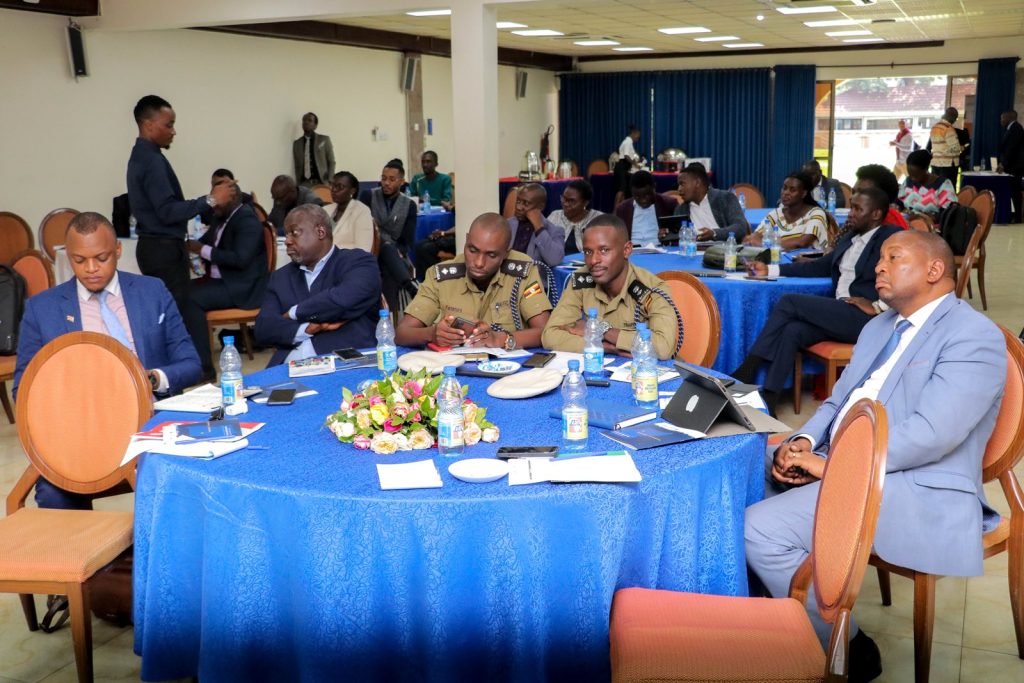
Helmet Use in Kampala
Helmet use compliance among motorcyclists was notably low at 39%, and even lower for passengers at 2%. This trend persisted on both local and collector roads (39%) and arterial roads (40%). During weekends, helmet use dropped by 20%. Ride-share motorcycle drivers, particularly Safe Boda, exhibited the highest compliance at 84%, surpassing commercial motorcycle drivers (50%), taxi drivers (55%), and private/government motorcycle users (55%).
From 2020 to 2022, 210 motorcycle occupants and 185 pedestrians lost their lives. Notably, 40% of pedestrian fatalities resulted from collisions with cars, SUVs, or pickups, whereas 36% of motorcycle deaths were attributed to accidents involving other motorcycles.
“We saw that only 2% of the motorcycles are using helmets. This really means that the situation is still bad. We need to put in place measures knowing that helmets save those that are wearing them,” says Balugaba.
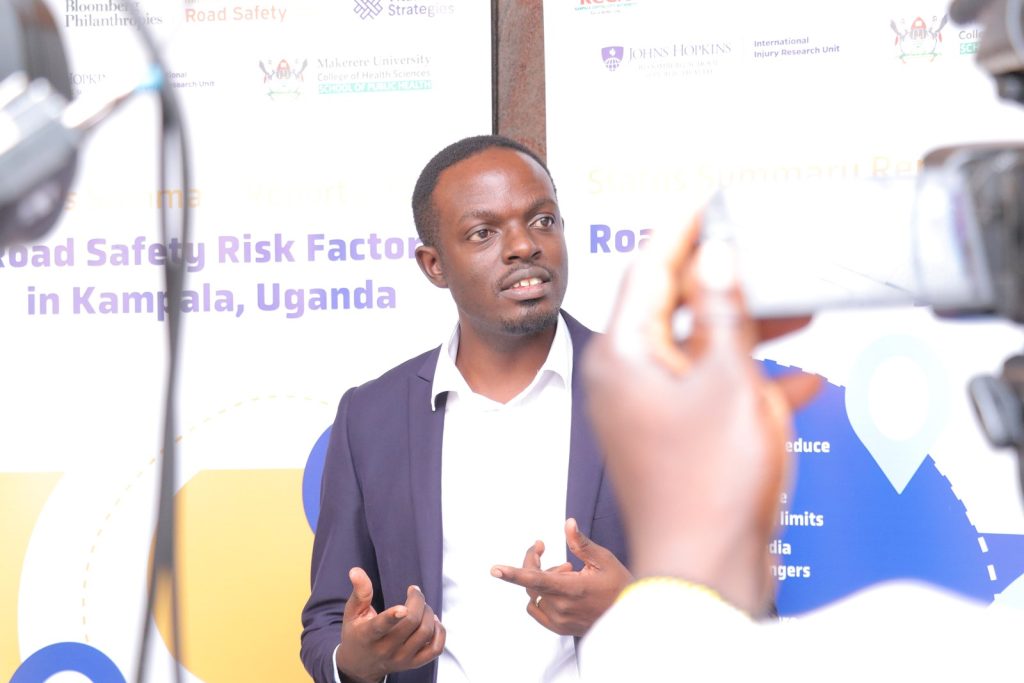
Adding that while four of every 10 riders are wearing a helmet but less than one in every 10 passengers has a helmet. “is it that passengers have harder heads than riders? That in case they are involved in a crash, they don’t get affected? These are issues we need to work on.”
While sharing the data outcomes, Dr Raphael Awuah, the African Regional Advisor on Data and Surveillance for Vital Strategies notes that while many of the cities in Africa, pedestrians constitute the majority fatalities, this is different for Kampala. “For most parts of Africa, we see that pedestrians account for most fatalities. However, in Kampala, this is not the case. We see that majority of the deaths are among the motorcyclists and this trend has been observed since 2018. So clearly this emphasizes the need to prioritize the vulnerable road users in Kampala particularly motorcyclists and pedestrians.”
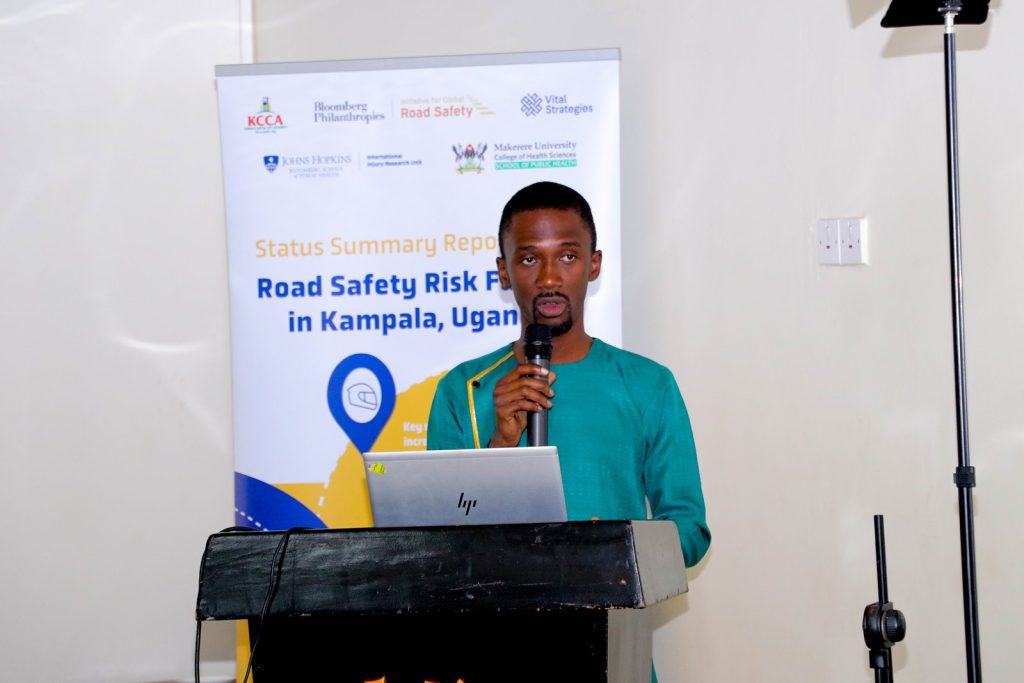
The top five locations for pedestrian fatalities and serious injuries from 2019 to 2022 are high-capacity roads: Kampala Road, Jinja Road, Bombo Road, Entebbe Road, and Masaka Road.
The distribution of motorcycle fatal crash locations does not exhibit any clear pattern, but there is a noticeable concentration on high-capacity highways. Kampala Road, Masaka Road, Bombo Road, Kisaasi Road, and the Northern Bypass are the top five places.
“While it is true that these are high capacity roads, speeding is probably one of the causes of fatalities. I hope we will use this data to inform the discussions, actions, plans, strategies to reduce the outcomes that I have just shared,” observed Dr Raphael Awuah.
The Kampala Metropolitan Traffic Police has been urged to increase the enforcement of proper helmet use, with a focus on passengers, taxis, and commercial motorbikes on arterial, local, and collector roads all week round. Also, KCCA and the Ministry of Works and Transport may want to start public awareness programs promoting the appropriate use of helmets and advocate for sanctions and fines for improper helmet wear in conjunction with coordinated increased enforcement.
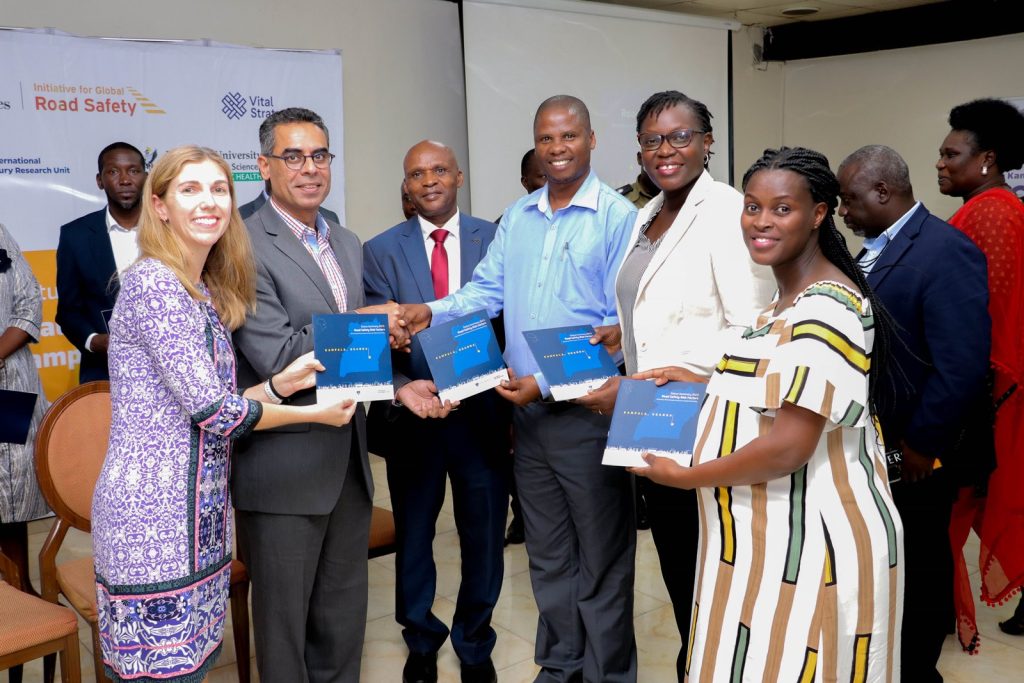
“This is about behavioral change. It is extremely difficult. We are all humans. All of us know that speeding is bad for us but when we get behind the wheel, we will still try to speed. All of us know that wearing a helmet will protect our heads, but only 2% of us wear helmets when we are riding on a motorcycle. So what else is needed? Yes, knowledge is important, it is important to tell people why they should be putting on these helmets and the consequences they will face if they don’t wear them but it is also important to have reinforcing mechanism. Yes, mass media campaigns are important but equally important is visible and widespread enforcement,” explained Dr. Abdulgafoor Bachani, Director of JH-IIRU.
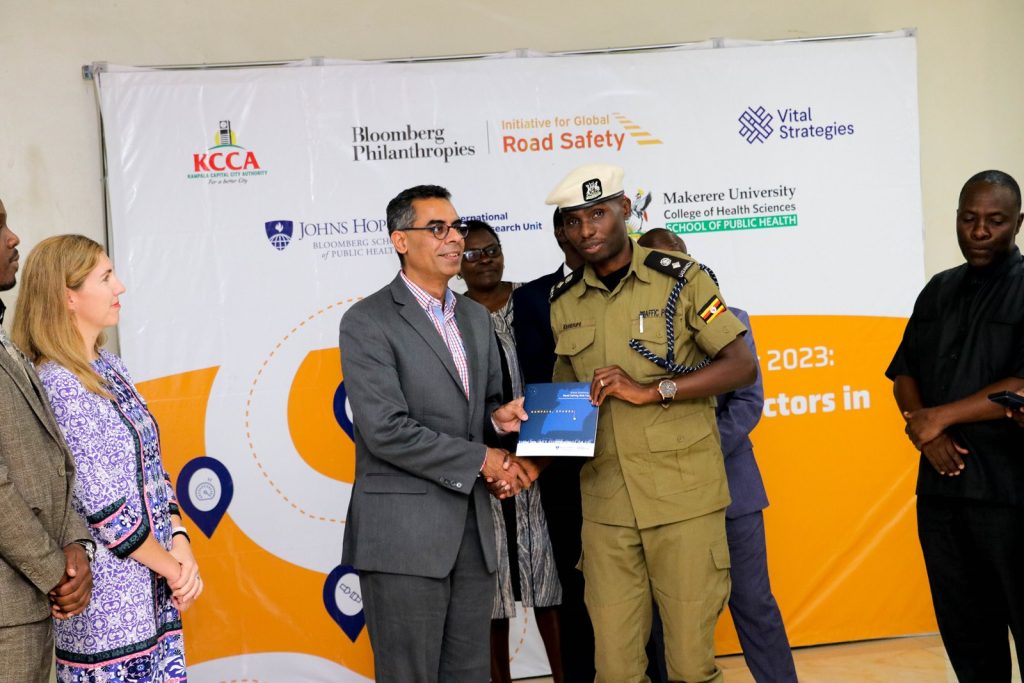
On his part, Dr. Fredrick Oporia said “Road safety is an issue of concern to everyone. To improve this safety, we must have high-quality data on the risk factors and share it with our stakeholders. Most importantly, we need local stakeholders who are charged with making laws and policies for the country because this is a systems issue that calls for systems thinking. We must involve the local to get the attention of the international.”
SP. Michael Kananura, spokesperson, Traffic and Road Safety Directorate, Uganda Police Force says there is a regulation on helmet use targeting not only riders but also passengers, although he acknowledges challenges with enforcement. He calls on the public support these public health and road safety measures.
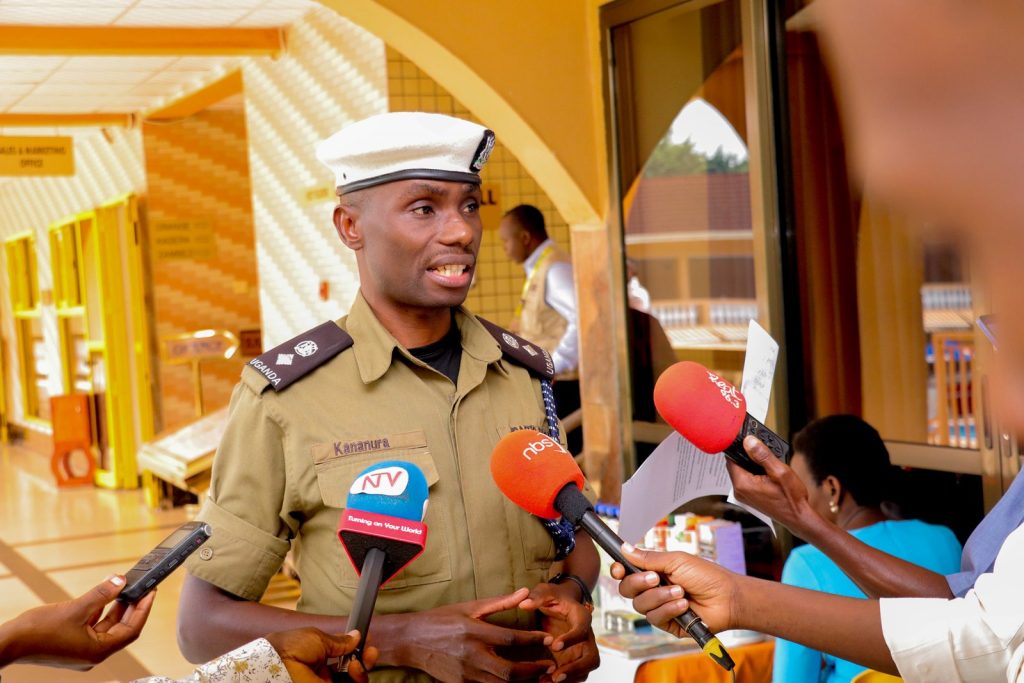
“We really appreciate our colleagues from MakSPH and the rest for this work and the academia generally for the work you are doing in as far as research is concerned and also being able to share with us this data. We also use this data to improve in our enforcements. It guides us on areas of improvement and prioritization. The data really is so helpful to us and we also continue to work to see how we can improve in that area. We have a unit in traffic directorate that is for enforcement basically,” SP Kananura.
Comments from KCCA leadership
Hon. Kizza Hakim Sawula, the lord councilor from Lubaga and Executive Secretary and a Minister for Works and Physical Planning –KCCA noted that one of the causes of this these accidents in the capital city is the poor-quality roads that wear out easily with numerous potholes and the meagre maintenance budget appropriated by parliament to the city authority.
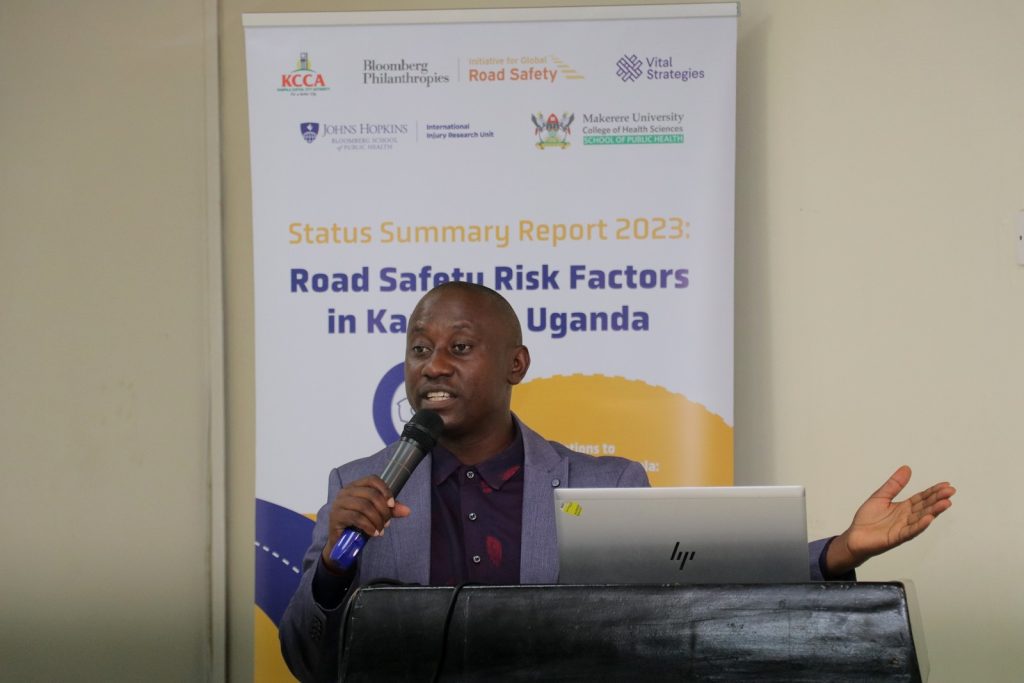
“Can you imagine that each kilometer of the road within Kampala is constructed at an average cost of 14 billion shillings. For the last three budgets, we were getting 78bn but but in the current budget, we received only 43 billion shillings for the entire capital, for the entire financial year for roads, drainages and traffic lights. How many kilometers are we looking at? 3 kilometers for a financial year, 43 billion shillings?
We used to get Shs26 billion from the national road fund, for road maintenance every financial year. You can confirm from the mayors and load counselors here. This time around, we received only 11 billion for all the maintenance. Now, what do we expect out of that money? So, the task is upon the members of the Parliament to improve on the budget. We have 2,110 kilometers of roads within Kampala. Only 654 kilometers are paved, when shall we complete the entire balance? So, we need a budget, enough budget from the members of parliament. When we talk to MPs they only talk about loans we get from development partners which is usually for new roads,” explained Hon. Sawula.
Concerned, Nakawa Division Mayor, Paul Mugambe said it was disheartening that many people continue to lose their lives prematurely. He cited that not every death is predetermined by the Lord. “Driving at excessively high speeds, and resulting in a crash is not the Lord’s decision. Many individuals lose their lives prematurely due to reckless behavior, and it’s truly regrettable.”
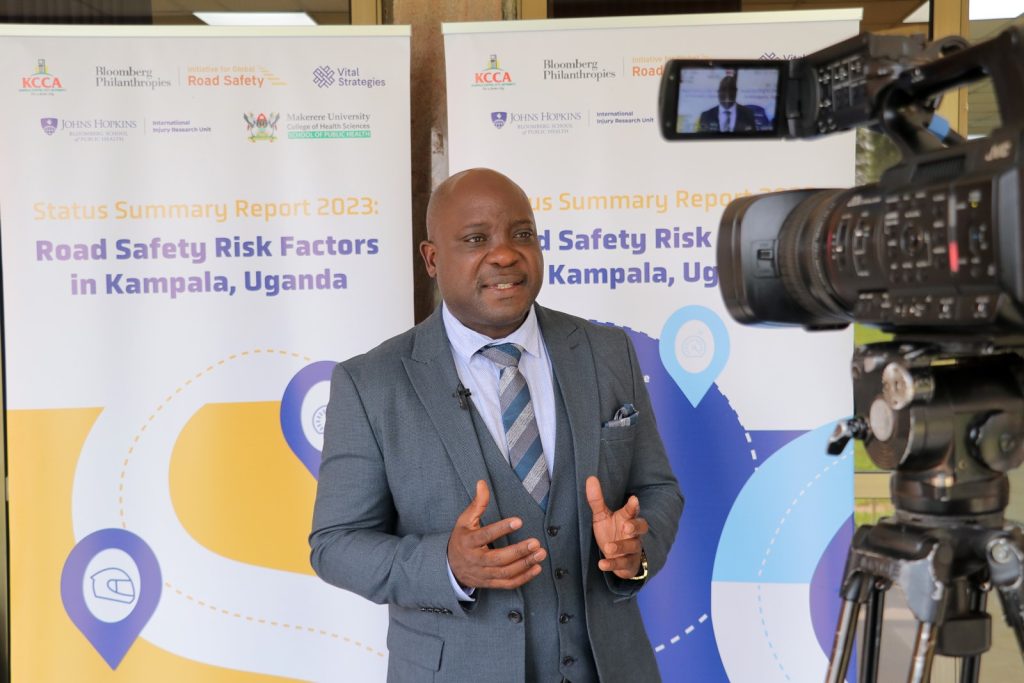
Mr. Mugambe urged Police to use the evidence provided to improve on the enforcement of road traffic laws and regulations.
Prof. Elizeus Rutebemberwa, the Deputy Dean, MakSPH thanked the Bloomberg Philanthilopies “for supporting us to help ourselves” and the JH-IIRU for the technical support to the TRIAD unit, the university and many partners. He also noted that the urban population in Uganda is steadily increasing and called for proactive and inclusive urban planning.
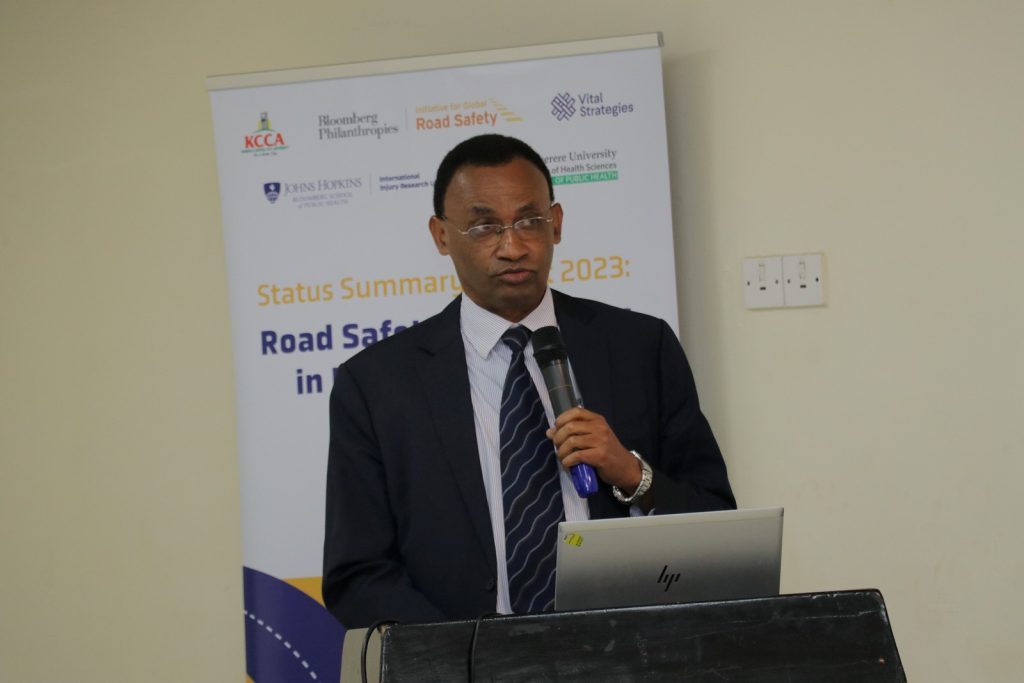
“From 2012, the urban population was 20%. In 2022, which is one year and a half ago, it was 26%. So, one in four people in Uganda were in urban areas. Now in 2040 it is estimated that 33 million would be living in urban areas and that would be 46%. So, it’s not getting better, it’s getting worse. So, we need to manage our urban areas so that people don’t shift from the rural areas to come to die in urban areas,” said Prof. Rutebemberwa.
He called on government and the city authority to fast-track mass transport systems to reduce congestion on the roads. “Look at the traffic that come to Kampala. They are in private cars and each one is carrying one person. In very few cases, two people. Now, if you have all those cars for one kilometre stretch, you could actually park all those people in one bus. And you have all space and you reduce the pollution, why should this be difficult for people to know that. For you to have an organized urban area, you need mass transport. You don’t need to research to know that. So why don’t we have them? Some of these things, some of them we talked about in the national drive, dedicated walk lanes.
According to Becky Bavinger, from the public health area of Bloomberg Philanthropies, road traffic injuries are the leading cause of death for people aged 5 to 29. She mentioned that the fatalities from road traffic are at a crisis level in Uganda.
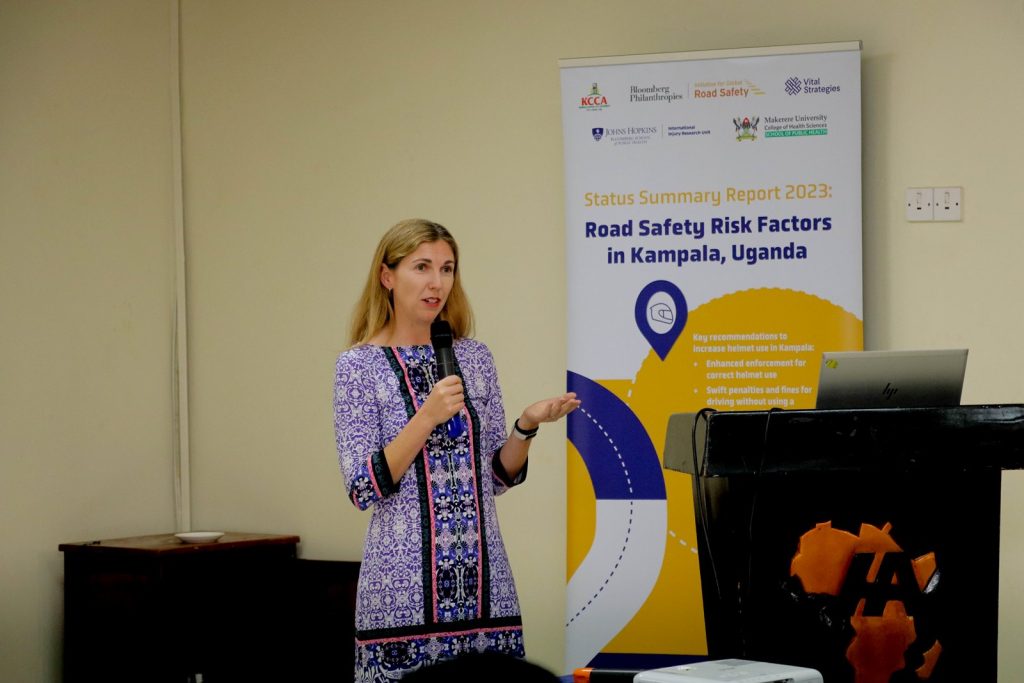
“I want to say this again. This is the leading cause of death. It’s not HIV. It’s not tuberculosis. It’s real traffic injuries for people aged 5 to 29. Those are the young people. We had the mayor talking about the economic impact as well. These are young people going to school, getting trained, coming back into your workforce, starting out in the workforce, and you’re losing their lives. There’s a forthcoming research from the Road Safety Coalition Uganda looking at the loss of GDP from road traffic injuries. In 2017, your government reported 3,500 deaths. The WHO estimated it was double that at about 6,000. It has gone up. In 2021, your government reported 4,159 deaths. Again, the WHO estimated it was about double that at 7,300. This is not good. This is a crisis and we need everyone working together on it,” Ms. Bavinger said.
She noted that Bloomberg Philanthropies will be working over these next two years with KCCA and with the government of Uganda to institutionalize data collection and the surveillance of road traffic injuries and deaths to improve its accuracy.
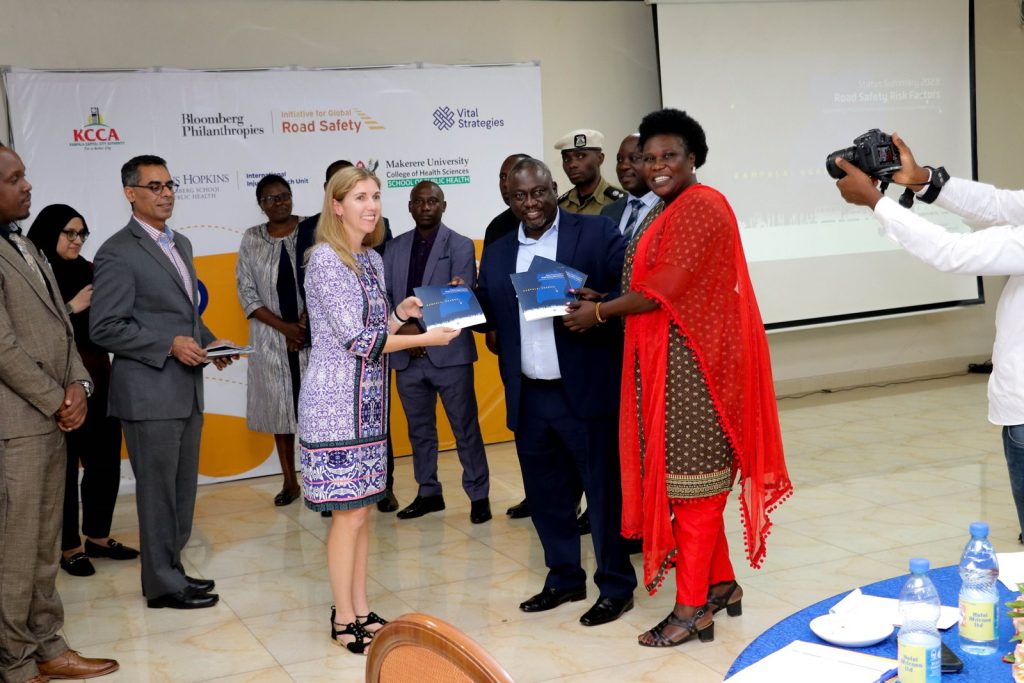
“These data are critical to forming your decision making. I just want to conclude by saying congratulations to Makerere University, to Johns Hopkins University, but ultimately to KCCA for launching this report, for conducting this research and this is not easy research to conduct. To the stakeholders, use these data. Please, please do not go home and put this report on your shelf. Look through it. Talk to the journalist. Get the media to write stories about this, let everyone know what is happening,” said Bavinger.
You may like
-


Emorimor Calls for Makerere to Upgrade Parenting Course
-
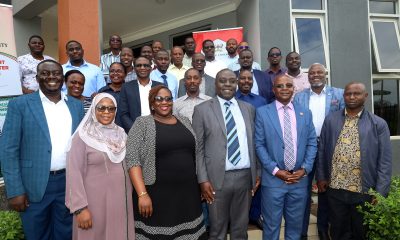

Uganda Deepens Economic Governance with Training on Regulatory Cost-Benefit Analysis
-


UVCF Makes Case for HEAC Programme
-


Mastercard Foundation Board pays its inaugural visit to Makerere University
-
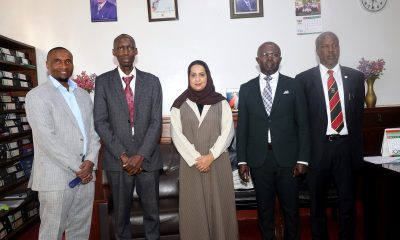

Mak CEES discusses partnership with King Salman Global Academy for the Arabic Language
-
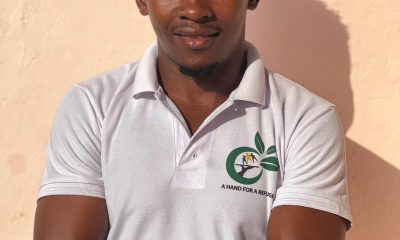

Meet Safali Libia, a Mastercard Foundation Scholar-alumnus who rebuilt his life as a refugee in Uganda
Health
Emorimor Calls for Makerere to Upgrade Parenting Course
Published
7 hours agoon
June 30, 2025By
Zaam Ssali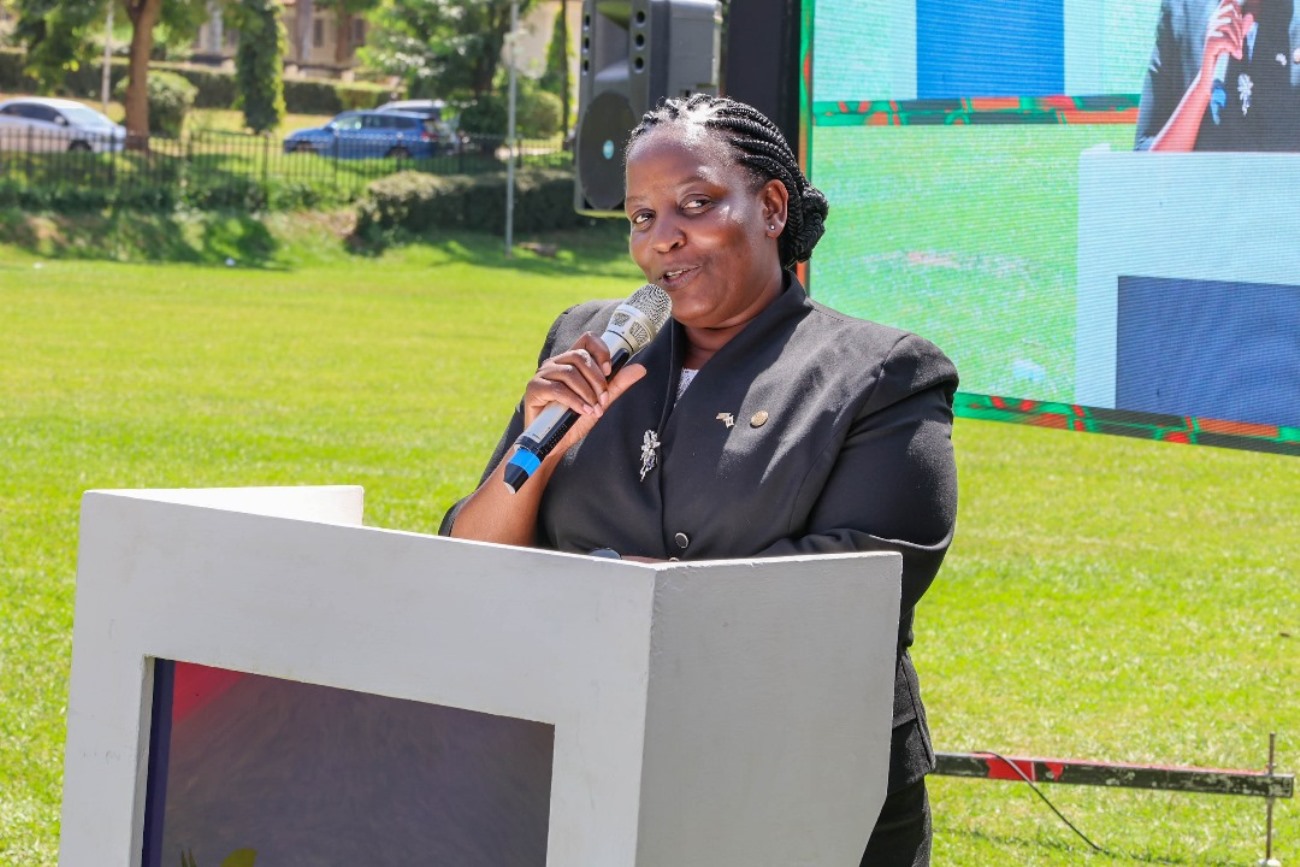
The Iteso Cultural Leader, His Highness Emorimor Papa Paul Sande Emolot, has called on Makerere University to elevate the Science of Designing, Adaptation, and Implementation of Evidence-Based Parenting Interventions course into a fully-fledged programme. This, he argued, would strengthen the capacity of practitioners implementing parenting interventions across Uganda.
Speaking at a graduation ceremony held on 11th June 2025 at Makerere University where 35 practitioners completed the 12-week course, Emorimor Papa Emolot emphasized the transformative power of effective parenting. He urged aspiring parents and advocates of the Parenting for Respectability model to enroll in the course.
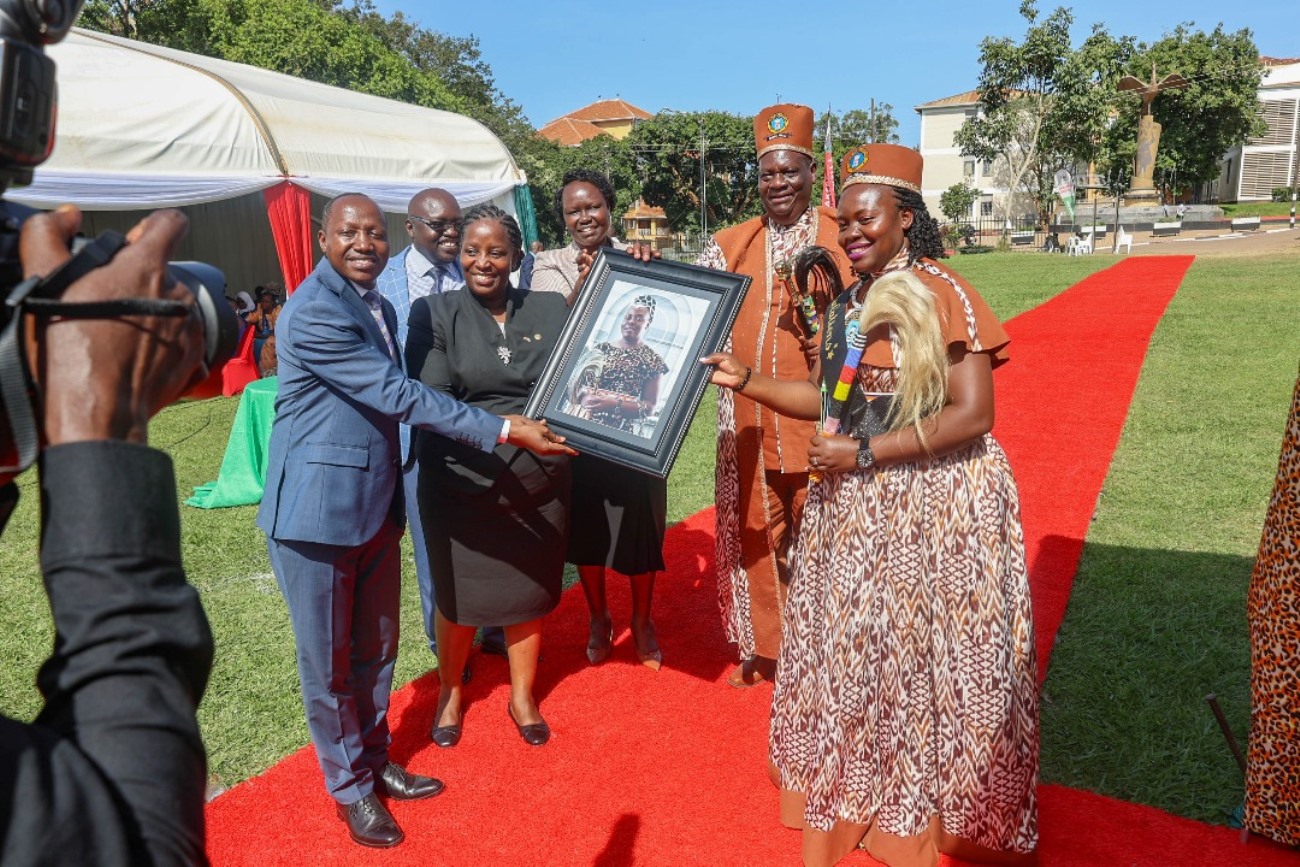
Citing the impact in his own sub-county and village, the cultural leader revealed that over 800 families had already benefited from the programme.
“We now see peace and love in homes where there was once conflict. Without good parenting, you risk raising animals instead of children,” he passionately stated.
He praised the course for equipping practitioners, policymakers, and researchers with the skills needed to design culturally sensitive, evidence-based parenting interventions tailored to Uganda’s context. Among the notable graduates was Her Royal Majesty Juliet Among Emolot Atomeileng Akaliat Toto, who reaffirmed her commitment to advancing family-strengthening initiatives using the skills and knowledge acquired.
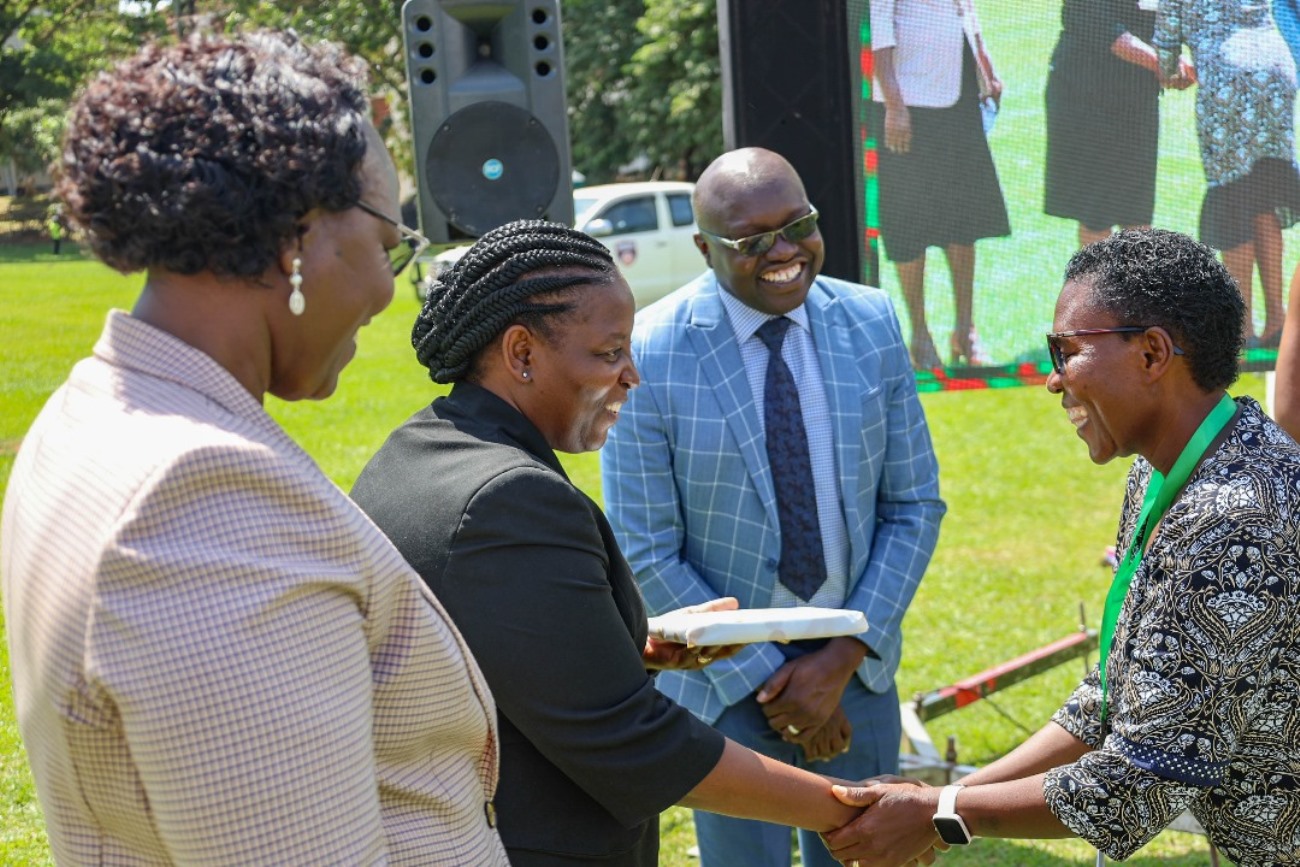
Dr. Godfrey Siu, Senior Lecturer and Course Leader at Makerere University, described the course as a timely intervention. During this remarks, Dr. Siu described the event as a significant milestone in advancing the field of evidence based parenting intervention and family strengthening in Uganda.
“This course is meant to empower you as practitioners, policy makers and all those involved in development and implementation of parenting work. It provides both theoretical knowledge and practical tools essential for developing high quality interventions”, Dr. Siu noted. He urged the pioneer group to carry forward the expertise as champions of designing, adaptation and implementation of evidence parenting interventions.
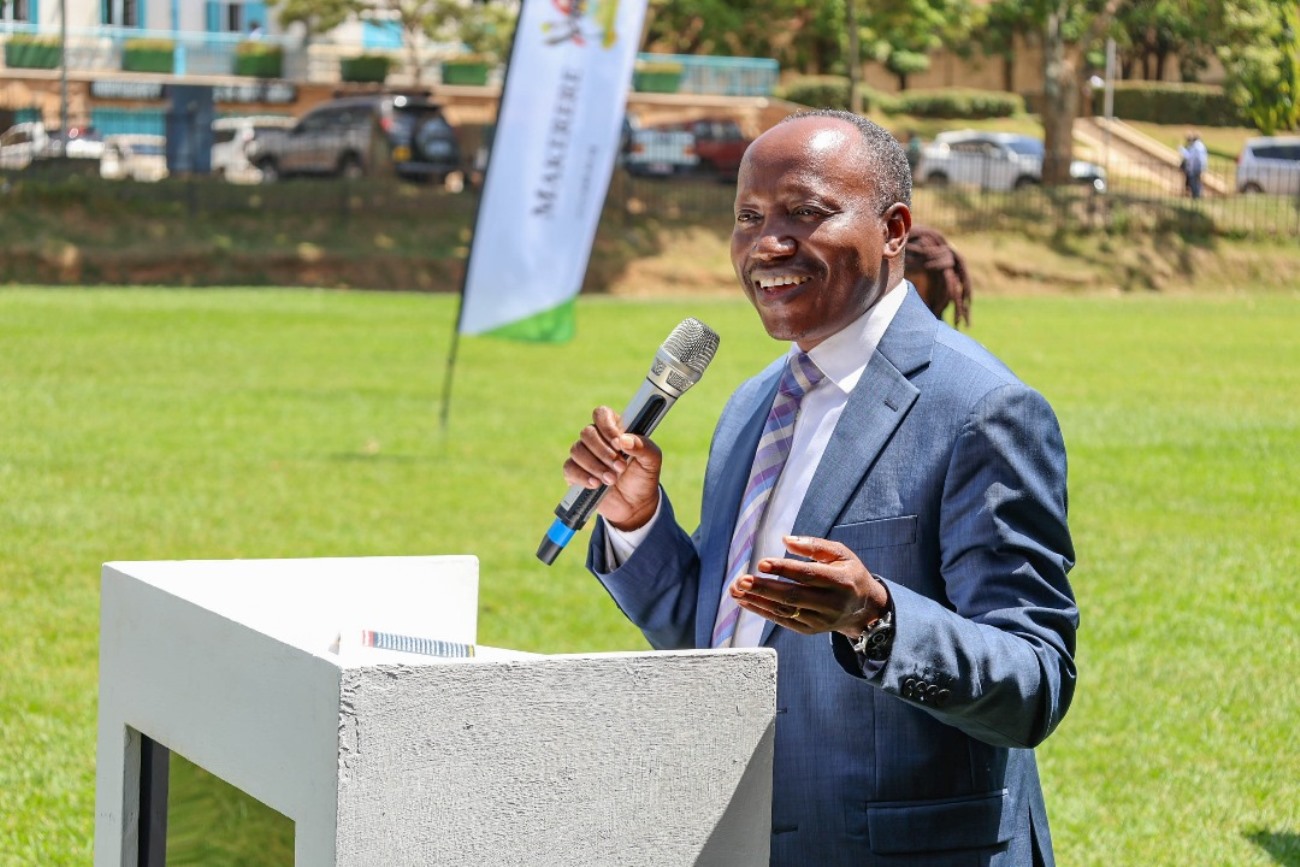
Representing the Permanent Secretary of the Ministry of Gender, Labour and Social Development, Dr. Aggrey David Kibenge, Juliana Naumo, Commissioner for Culture and Family Affairs, said the course supports the government’s agenda to address negative social outcomes affecting families.
“By grounding parenting in research, harmonizing policy with practice, and advocating for equity, we will ensure no family is left behind,” she said. “Cross-sectoral collaboration is key to unlocking transformative change.”
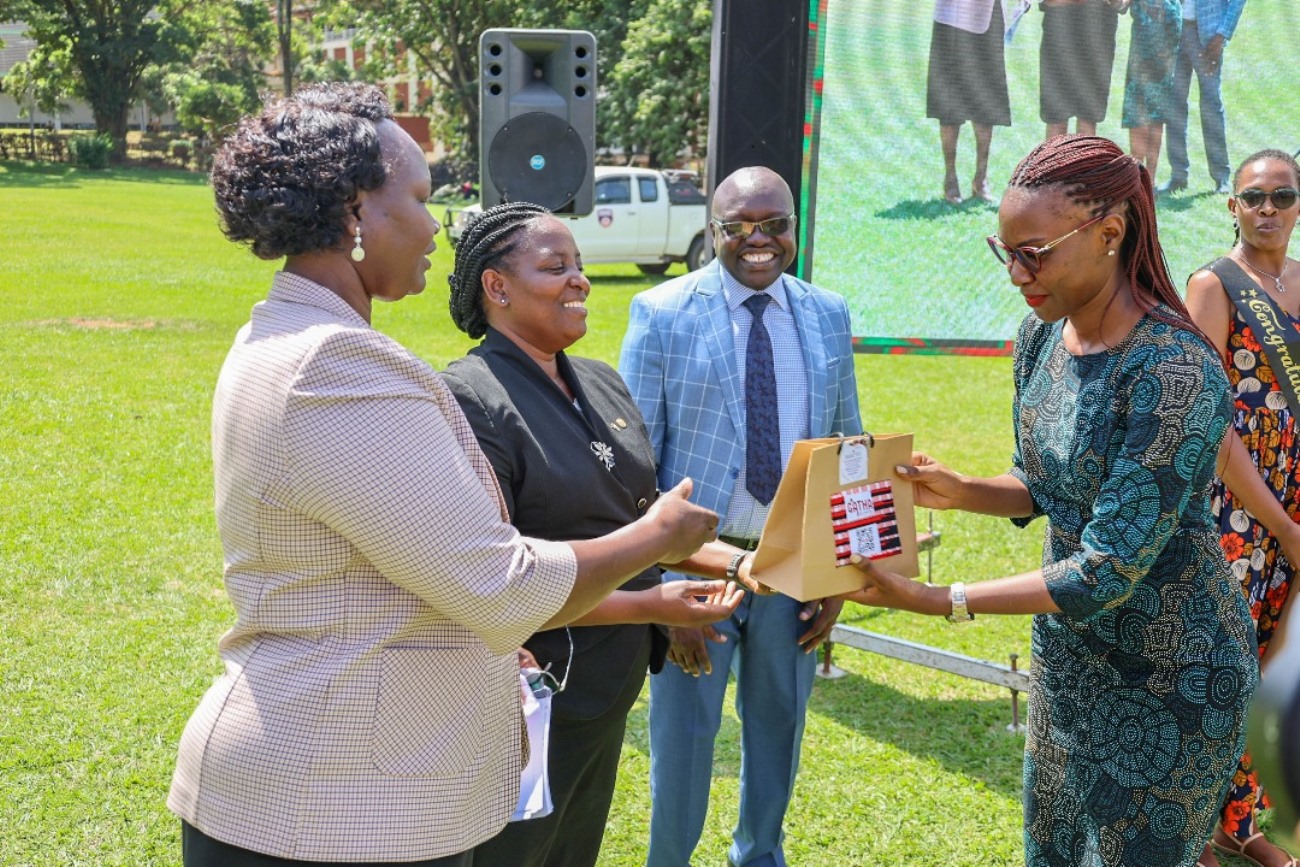
Ms. Naumo highlighted the government’s commitment—both technical and financial—to support outstanding student projects from the course. She stressed the importance of equipping professionals with the skills to bridge gaps between research and practice for consistent, high-quality parenting support across Uganda. While delivering the Vice chancellors speech by Dr. Helen Nambalirwa, Principal of the CHUSS, Prof. Barnabas Nawangwe commended the graduates as a beacon of hope.
“At a time when parenting faces challenges like digital distractions, changing societal norms, and a rising mental health crisis, Makerere reaffirms its support for interventions that drive the societal transformation we desire,” Nawangwe stated.
Prof. Richard Idro, Deputy Principal of the College of Health Sciences, acknowledged the growing parenting challenges in Uganda and the region, adding that the course was a major step towards standardizing parenting interventions nationwide.

He applauded the Child Health and Development Centre (CHDC) for leading this paramount and critical initiative.
Mr. Hosea Katende, Course Administrator at CHDC, emphasized the importance of integrating systematic methods, ethical principles, robust evidence, and collaboration to create lasting impact in parenting.
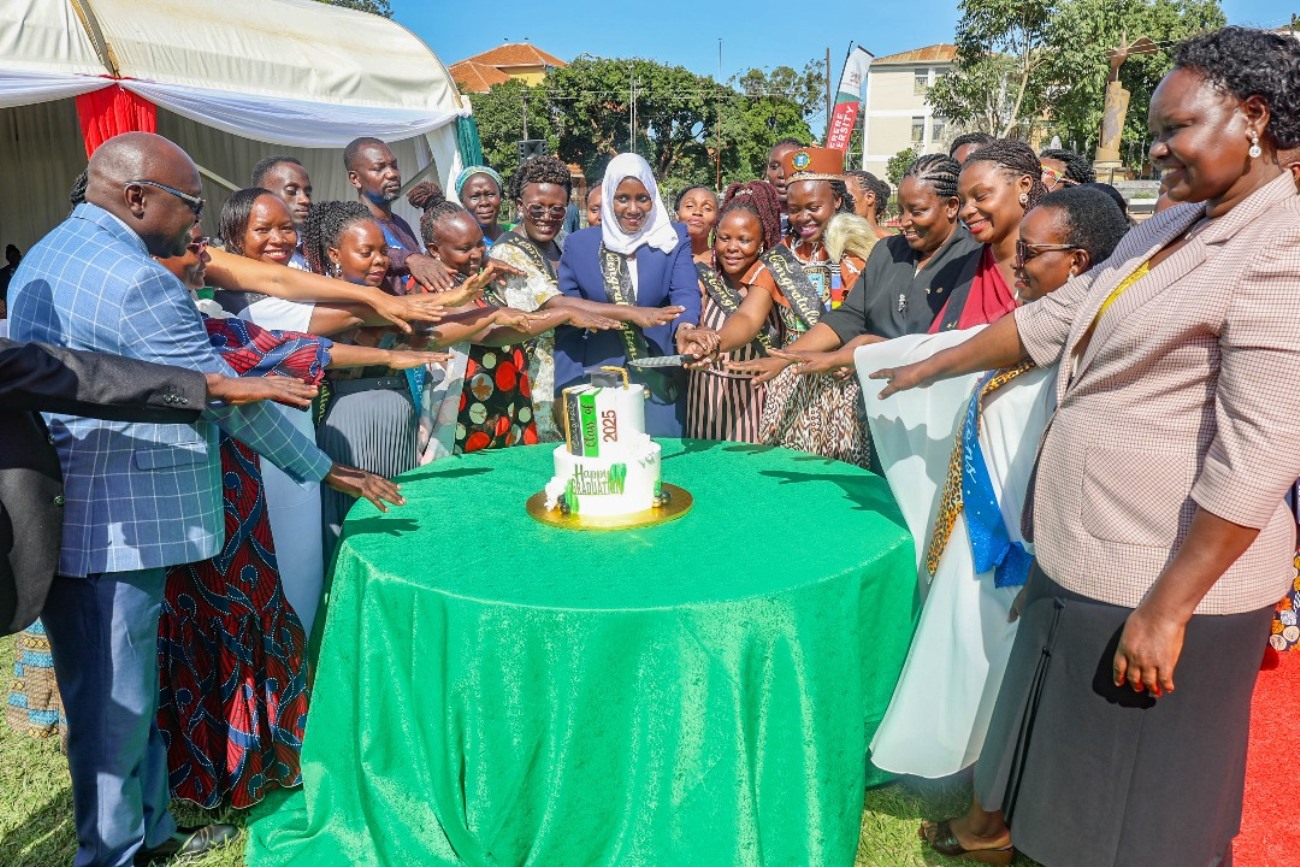
Dr. Aggrey Dhabangi, Lecturer at CHDC, representing Dr. Herbert Muyinda, Director of CHDC, acknowledged the contributions of partners such as the ELMA Foundation and Echidna Giving for their financial and capacity-building support. He also appreciated the Ministry of Gender, Labour and Social Development, among other stakeholders, for their technical guidance in the programme’s successful implementation.
Dr. Dhabangi extended gratitude to cultural institutions, especially the Kingdom of Teso, and acknowledged growing collaborations with other cultural institutions such as the Kingdom of Acholi, in the shared mission of building strong families as the foundation of Uganda’s future.
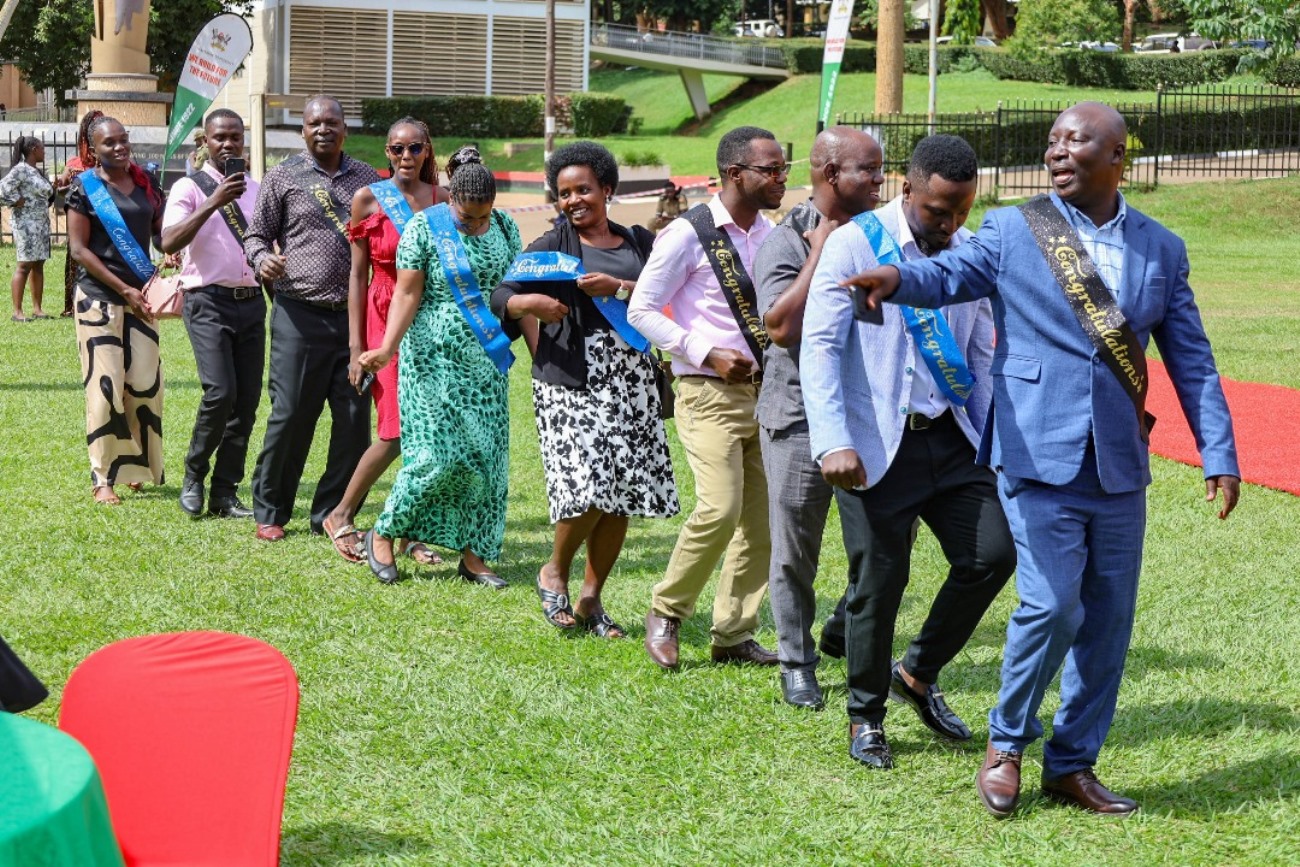
He extended his heartfelt gratitude to cultural institutions, especially the Kingdom of Teso, and others kingdoms such as the Kingdom of Acholi, in building Uganda’s future through creating strong families. Nuruh Mbalyowere, a Rehabilitation and Reintegration Officer with the Uganda Prisons Service, was honored for developing the best parenting intervention titled “Parenting Behind Prison Bars.” She expressed her intention to apply the knowledge gained both at home and in her workplace.
Health
MakSPH, DJC Launch Short Course on Health Communication
Published
1 week agoon
June 20, 2025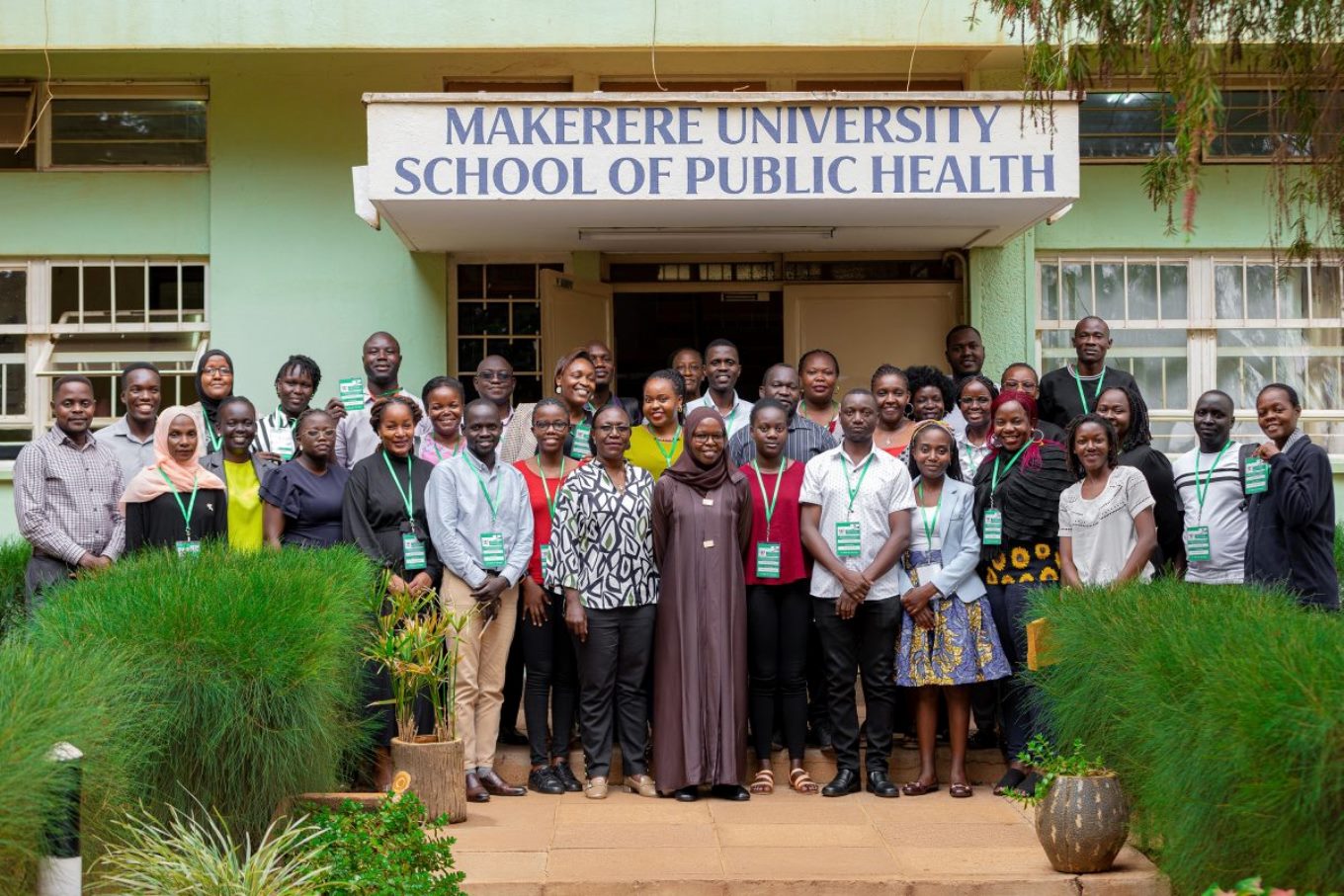
By Okeya John and Primrose Nabankema
The intensive one-month course, running for the first time from June 5 to July 24, 2025, is jointly offered by Makerere University School of Public Health (MakSPH)’s Department of Community Health and Behavioural Sciences (CHBS) and the Department of Journalism and Communication (DJC) at the School of Languages, Literature, and Communication (SLLC), co-designed in 2024 with support from the Rockefeller Foundation through Amref Health Africa.
It seeks to equip healthcare providers at the community level, public health and environmental health practitioners, communication specialists, health educators, community development officers, social scientists, and policy makers, among others, with strategic communication skills to improve public health messaging, strengthen community engagement, and support evidence-based interventions, ultimately empowering participants to effectively engage communities and improve population health outcomes across Uganda and the region.
Launching the course, the heads of the Department of Journalism and Communication and the Department of Community Health and Behavioural Sciences noted that participants who complete the short course will gain practical tools to influence behaviour change, build trust, and deliver timely, accurate, and relevant health information to the communities they serve. The first cohort attracted more than 60 applicants, with 36 reporting for the opening in-person session on June 5, 2025, at MakSPH in Mulago. Between now and July, participants will undergo a hands-on, multidisciplinary learning experience within the Certificate in Health Communication and Community Engagement program, which combines theory and practice.
Among the participants in the first cohort of the certificate course, designed as a pilot for the anticipated Master of Health Promotion and Communication to be jointly offered by the two departments at Makerere University, is Ms. Maureen Kisaakye, a medical laboratory technologist specialising in microbiology and antimicrobial resistance (AMR), and currently pursuing a Master’s in Immunology and Clinical Microbiology at Makerere. She is driven by a passion to help reverse the rising tide of AMR, a growing global health threat where drugs that once worked are no longer effective. Kisaakye is particularly concerned about common infections, like urinary tract infections, becoming increasingly resistant and harder to treat.
“I enrolled in this course because I’m an advocate against antimicrobial resistance, and it came at a time when I needed to deepen my knowledge on how to implement our projects more effectively and engage with communities. The experience has broadened my understanding of AMR and its impact on society, and strengthened my passion for community-driven health initiatives and advocacy,” Kisaakye said, explaining why she enrolled for the short course.
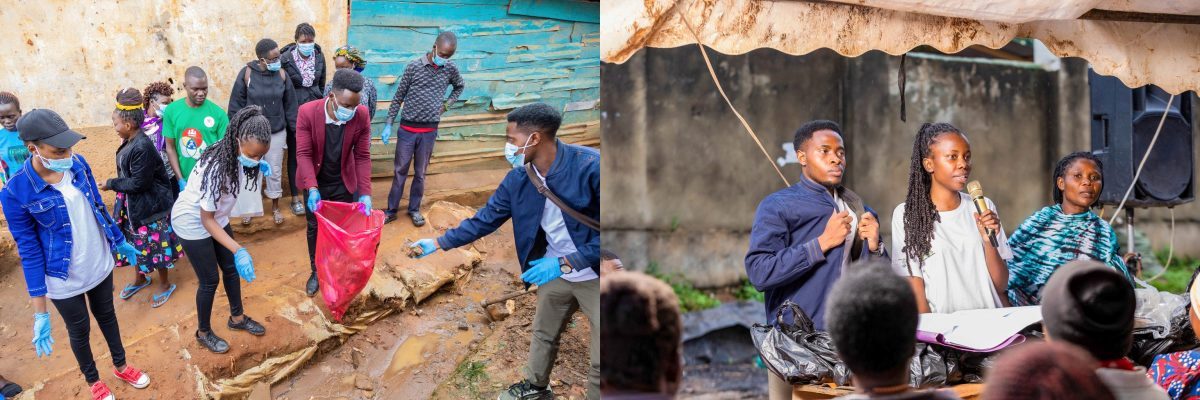
Kisaakye’s work in antimicrobial resistance extends beyond the lab. Having earned her degree in medical laboratory science from Mbarara University of Science and Technology, she founded Impala Tech Research in 2024 to drive impact and save lives. She has led grassroots AMR campaigns that integrate antimicrobial stewardship with water, sanitation, and hygiene (WASH) education in underserved urban communities, including the informal settlements in Kampala. She also has since designed peer-led initiatives that empower university students as AMR Champions, building a network of informed youth advocates. Kisaakye believes the health communication course will sharpen her ability to design and deliver impactful, community-centred interventions in response to the growing threat of drug resistance.
“The department collaborates with many partners within and beyond the University, including the School of Public Health, where we are working to develop the subfield of health communication and promotion. Our goal is to train specialists in this area and build a community of practice, something we have each been doing in our own spaces. There’s a lot of work ahead, and COVID-19 showed us just how urgently we need a generation trained to do this kind of work, and to do it very well,” said Dr. Aisha Nakiwala, Head of the Department of Journalism and Communication, during the opening of the short course on June 5.
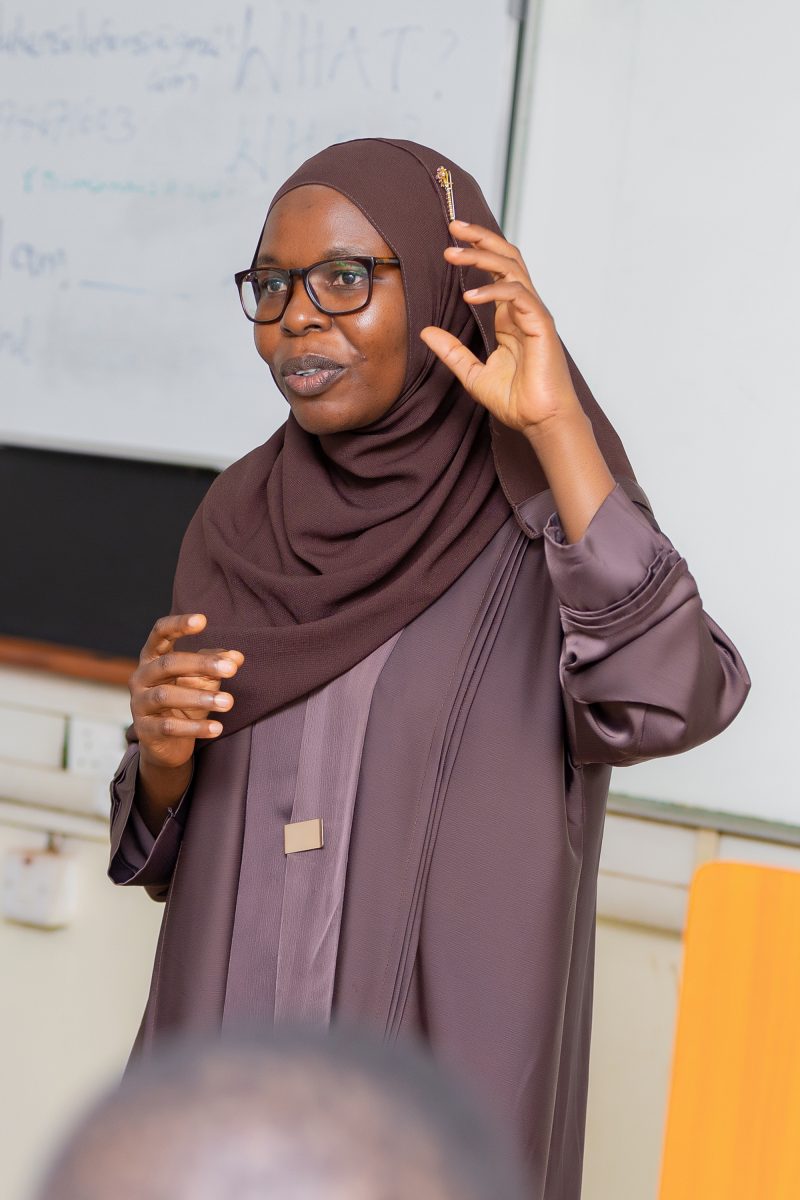
She assured participants they were in good hands and underscored the importance of the partnership between the Department of Journalism and Communication and the School of Public Health, describing it as a vital collaboration that brings together strategic communication and public health expertise. This dynamic, multidisciplinary approach, she noted, is essential to developing practical solutions that empower communities, strengthen health systems, and ultimately improve livelihoods.
The course offers a hands-on, multidisciplinary learning experience, with participants intended to explore key modules including Health Communication and Promotion, Risk Communication, Smart Advocacy, Community Mapping, Community Mobilisation and Empowerment, and Strategies for Community Engagement. The course combines theory with real-world application, and its assessment includes a field-based project and a final exam.
“You are our first cohort. We are seeing the fruits of our efforts in bringing this short course to life. It was born out of a joint initiative to develop a Master’s programme in Health Promotion and Communication,” said Dr. Christine Nalwadda, Head of the Department of Community Health and Behavioural Sciences. “We carried out extensive consultations with our different key stakeholders during the process and discovered a real need for such a course. It was the stakeholders who even named it; this course name didn’t come from us.”
For Kisaakye, by the end of the course in July, she hopes to have sharpened her skills in health promotion and strategic communication, particularly in crafting targeted messages that help individuals and communities effectively respond to threats such as antimicrobial resistance. She also aims to gain practical experience in designing, implementing, and evaluating community health initiatives that can strengthen her advocacy and drive lasting impact.
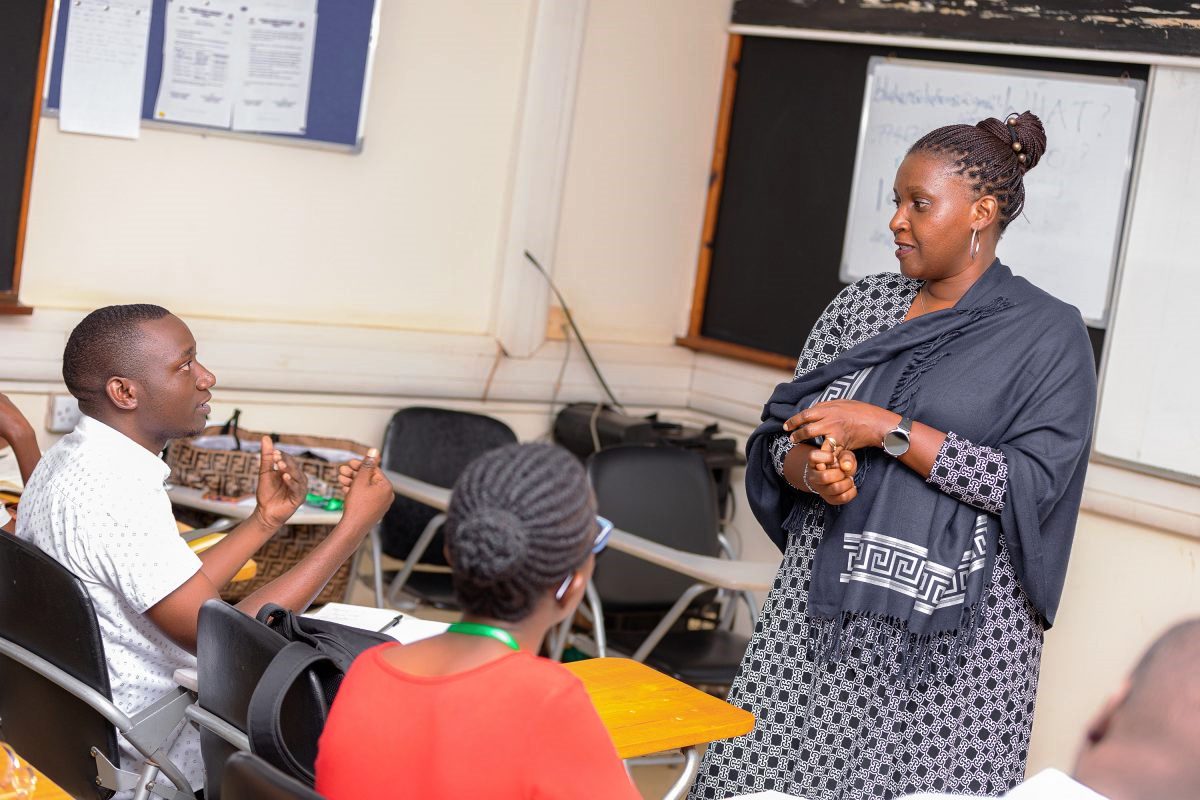
Health
Call for Abstracts: 2nd East African Symposium and Expo on Trauma, Injuries, and Emergency Care – 2025
Published
2 weeks agoon
June 19, 2025By
Mak Editor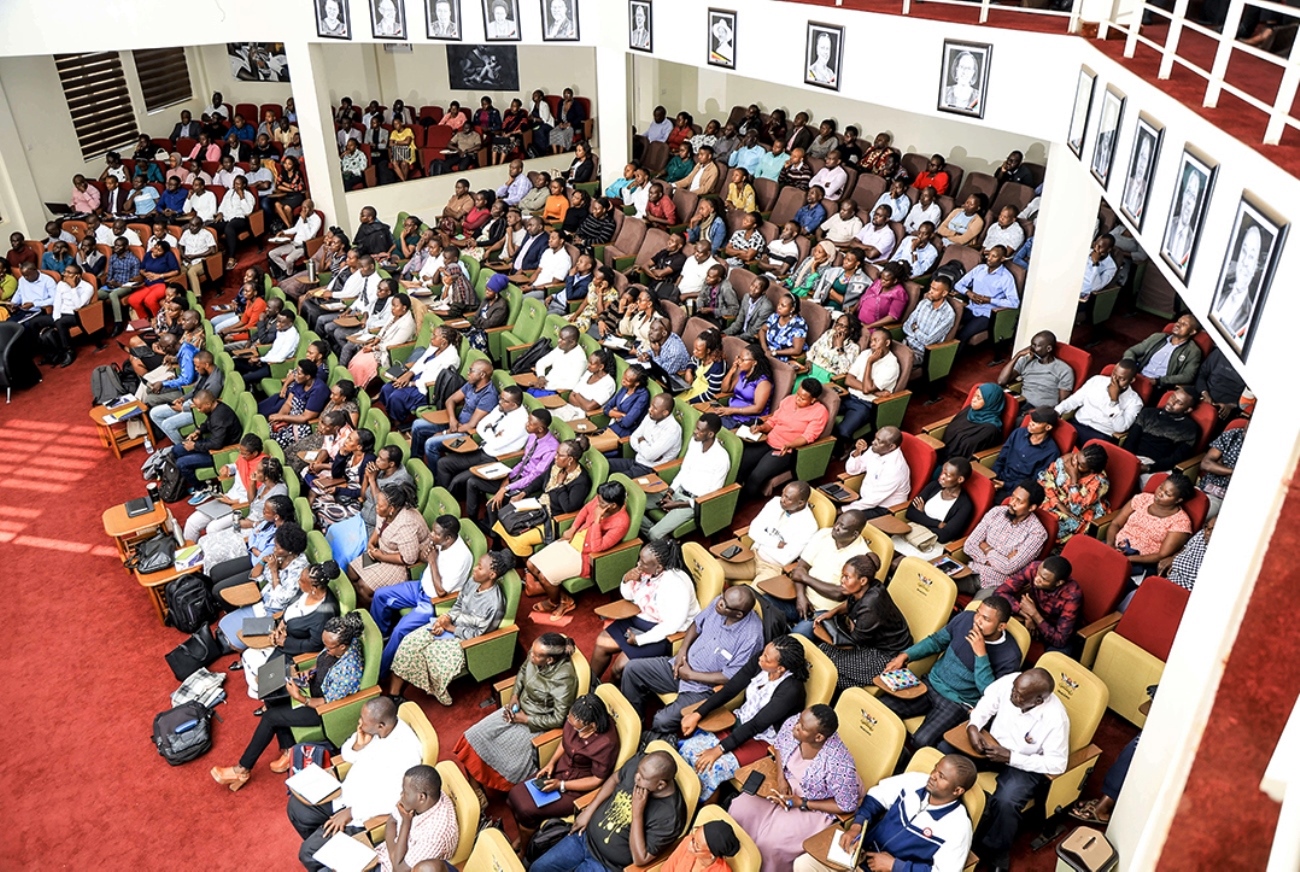
The Makerere University School of Public Health (MakSPH) is excited to invite researchers, professionals, and students to be part of an inspiring and impactful event!
Venue: School of Public Health Auditorium, Makerere University Main Campus
Dates: August 7–8, 2025
Theme: “Understanding the burden and impact of injuries in East Africa to improve Emergency Care preparedness, mitigation, and response.”
Submit Your Abstracts Now!
Join the conversation that drives change in trauma and emergency care across East Africa. Share your research, innovations, and insights that can shape the future of healthcare response in our region.
Submission Deadline: July 10, 2025
Submit here: triadcommunications@musph.ac.ug
Register to Attend: https://aapug.org/east-african-symposium-and-expo-on-trauma-injury-disability-and-emergency-care-2025/
Together, let’s drive change and improve lives through research and collaboration. Don’t miss this opportunity to make a difference!
Trending
-

 General3 days ago
General3 days agoMature Age Scheme Exam Results for 2025/2026
-

 General6 days ago
General6 days agoFreshers’ Joining Instructions 2025/2026
-

 General1 week ago
General1 week agoMastercard Foundation Board pays its inaugural visit to Makerere University
-

 General1 week ago
General1 week agoUVCF Makes Case for HEAC Programme
-

 Natural Sciences2 weeks ago
Natural Sciences2 weeks agoCoNAS Participates in the 2025 National Science Week Exhibition
